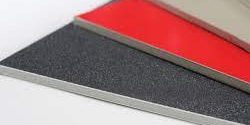Due to its adaptability, toughness, and aesthetic appeal, aluminium composite panels (ACP) have grown in popularity in the building sector. Whether you’re an architect, a contractor, or a homeowner, knowing the essential aspects and advantages of ACP will help you plan your projects more effectively. We will cover all you need to know about aluminium composite panels and its use in a variety of industries, including cladding, in this extensive guide. Continue reading to learn about the benefits, setup instructions, and maintenance advice for ACP.
What are Aluminium Composite Panels?
Two aluminium sheets are joined together to form sandwich-like constructions known as aluminium composite panels. The core material is often comprised of polyethylene (PE) or a fire-resistant substance (FR). ACP’s outstanding strength, light weight, and thermal insulation qualities are all a result of its unique composition. ACP is useful for a variety of applications because of the durability, weather resistance, and design flexibility offered by the outer aluminium layers.
Advantages of Aluminium Composite Panels:
2.1 Durability and Weather Resistance:
Aluminium Composite Panel is extremely robust and resistant to extreme weather, including UV radiation, moisture, and temperature changes. Moreover, it is corrosion-resistant, guaranteeing enduring performance and beauty.
2.2 Design Versatility:
ACP provides a wide range of design alternatives, enabling architects and designers to produce distinctive and aesthetically pleasing facades. The panels may be customised to meet the needs of particular projects thanks to their availability in a variety of colours, finishes, textures, and sizes.
2.3 Lightweight and Easy Installation:
ACP is lighter than conventional building materials, which makes it simpler to handle and install. The panels are simple to cut, bend, and shape, making installation simple yet labor-intensive.
2.4 Thermal and Acoustic Insulation:
Building energy efficiency and noise reduction are aided by the excellent thermal and acoustic insulation properties of ACP.
2.5 Fire Safety:
The availability of ACP panels with fire-retardant cores (FR) ensures improved fire safety in both commercial and residential constructions. These FR panels do not aid in the propagation of flames and emit little smoke.
Applications of Aluminium Composite Panels:
3.1 ACP Cladding:
The installation of ACP panels on the outside of buildings to improve their looks, offer weather protection, and increase insulation is known as ACP cladding. ACP is a great material for covering vast areas because of how lightweight it is.
3.2 Signage and Display Boards:
Due to their smooth surface, excellent printability, and durability, ACP panels are frequently used in signage and advertising boards.
3.3 Interior Design and Partitioning:
Additionally used in interior design, ACP panels are used for furniture, ceiling panels, and wall partitions, giving the room a contemporary, sleek appearance.
3.4 Transportation and Industrial Applications:
Aluminium Composite Panel is useful for both industrial applications like machine enclosures and control panels as well as the transportation sector for vehicle interiors.
Installation and Maintenance:
Installation of ACP takes careful planning and knowledge. To guarantee a secure and attractive result, it is essential to work with experts that have expertise installing ACP. To maintain the beauty and lifespan of the panels, routine maintenance requires frequent washing with gentle detergents and non-abrasive agents.
Conclusion:
ACPs (Aluminum Composite Panels) are lightweight, durable, versatile in terms of design, thermally insulating, and fire resistant. They are used in many industries, with ACP cladding being one among the more well-known examples. Making educated judgements for their building projects may help architects, builders, and homeowners. This is made possible by understanding the benefits and installation procedure of ACP. To improve the performance and look of your structures, embrace the adaptability and beauty of aluminium composite panels.

